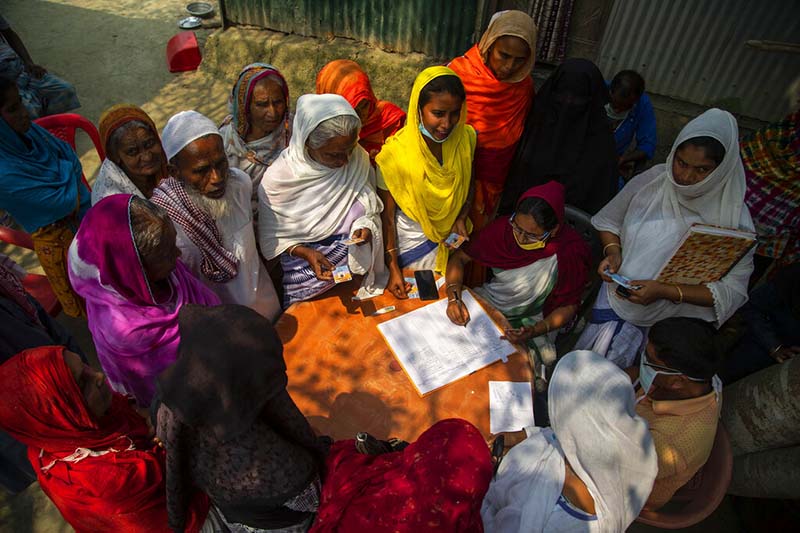

India reported a record daily surge in new coronavirus cases for the second time in four days on Wednesday, while New Delhi, Mumbai and dozens of other cities announced they are imposing curfews to try to slow the soaring infections.
The rise of 115,736 coronavirus cases reported in the past 24 hours, tops the 103,844 infections reported Sunday. Fatalities rose by 630 in the past 24 hours, the highest since November, driving the total death toll in the country to 166,177 since the pandemic began.
The federal government has so far refused to impose a nationwide lockdown to contain the latest surge but has asked states to decide on imposing local restrictions.
“The pandemic isn’t over and there is no scope for complacency,” Health Minister Harsh Vardhan said on Twitter. He urged people to get vaccinated.
India now has a seven-day rolling average of more than 78,000 cases per day and has reported 12.8 million virus cases since the pandemic began, the highest after the United States and Brazil.
While 85 million Indians have received at least one coronavirus vaccine shot, only 11 million of them have received both.
Due to a surge in infections, India has now delayed exports of large quantities of vaccines. It has shipped 64.5 million doses so far.
Experts say the surge, which is worse than last year’s peak in mid-September, is due in part to growing disregard for social distancing and mask-wearing in public spaces.
As health officials continue to warn about gatherings in public places, Prime Minister Narendra Modi and his party leaders continue to hold mammoth rallies in several states where local elections are underway.
While on the campaign trail Tuesday in West Bengal state, Modi was seen waving at maskless supporters from his car.
His government has also allowed a huge monthlong Hindu festival that draws tens of thousands of devotees daily to go ahead on the banks of the Ganges River in northern Uttarakhand state.
In other developments in the Asia-Pacific region:
— North Korea has continued to claim a perfect record in keeping out the coronavirus in its latest report to the World Health Organization.
At the beginning of the pandemic, North Korea described its efforts to keep out the virus as a “matter of national existence.” It shut its borders, banned tourists and jetted out diplomats. The country still severely limits cross-border traffic and has quarantined tens of thousands of people who have shown symptoms. But it still says it has found no case of COVID-19, a widely doubted claim.
In an email to The Associated Press on Wednesday, Edwin Salvador, WHO’s representative to North Korea, said the North has reported it tested 23,121 people for the coronavirus from the beginning of the pandemic to April 1 and that all results were negative. Salvador said the North said 732 people were tested between March 26 and April 1. WHO officials say the North is no longer providing the UN agency with the number of people it quarantines with suspected symptoms.
— South Korea has reported 668 new cases of the coronavirus, its highest daily jump in nearly three months, as concerns grow about another surge and a slow vaccine rollout.
The numbers released by the Korea Disease Control and Prevention Agency on Wednesday brought the national caseload to 106,898, including 1,756 deaths.
Most of the new cases were in the Seoul area and other major cities. Officials previously insisted a wait-and-see approach was feasible on South Korea’s vaccine rollout because the nation’s outbreak wasn’t as dire as those in America and Europe. Now, they say they are considering all possible measures to prevent a shortage, and it remains to be seen whether they would consider curbing exports of AstraZeneca shots produced by local firm SK Bioscience.
— Facing criticism for a vaccine rollout that’s behind schedule, Australia’s Prime Minister Scott Morrison notes his country has faced difficulty in getting promised vaccine doses from Europe. He said over 3 million of Australia’s contracted AstraZeneca vaccine doses haven’t yet arrived — but that shouldn’t be taken as him criticising the European Union.
“That’s just a simple fact. That’s not a dispute. It’s not a conflict. It’s not an argument. It’s not a clash. It’s just a simple fact. And I’m simply explaining to the Australian public that supply issues are what’s constraining and has constrained, particularly over these recent months, the overall rollout of the vaccine,” Morrison told reporters in Canberra.
He said he will write again to the European Union and AstraZeneca requesting they send the full order of vaccine doses. Morrison said some of the doses will be sent to help its neighbour Papua New Guinea deal with its virus outbreak. In March, Europe stopped about 250,000 vaccines going to Australia due to concerns about European supply shortages.